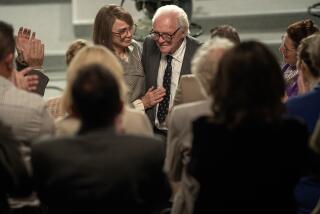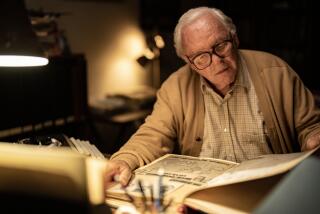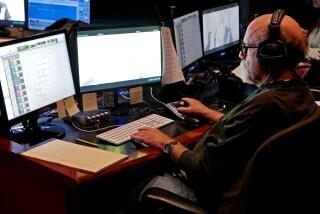How ‘Ready Player One’ became the rare Steven Spielberg movie not scored by John Williams
It’s impossible to imagine Steven Spielberg’s cinematic reign without John Williams. The composer has given life and indelible melodies both to Spielberg’s blockbuster adventures (“Raiders of the Lost Ark,” “E.T.”) and his heartbreakers (“Schindler’s List,” “Saving Private Ryan”).
But recently, time and circumstance have forced Spielberg to find his musical soul elsewhere. Since his theatrical debut “The Sugarland Express” in 1974, the director had only once hired another composer — Quincy Jones for “The Color Purple” — but Williams was unable to score “Bridge of Spies” in 2015 because of pacemaker surgery and his busyness on “Star Wars: The Force Awakens.”
When time came to score “Ready Player One,” Spielberg boxed himself in by fast-tracking “The Post” — and Williams could score only one of them.
“Of course it kills both me and John to have missed two opportunities to collaborate over the last three years,” Spielberg said in an email. “We are more than just collaborators. We are brothers.”
Enter Alan Silvestri, the two-time Oscar nominee who has given musical identity to “Forrest Gump,” “The Avengers” and the “Back to the Future” movies. It was the latter that made him a natural pinch hitter for “Ready Player One,” a movie that prominently features the iconic DeLorean and a device called the “Zemeckis Cube.”
“It’s way beyond a tip of the hat,” says Silvestri, 68. “Even in Ernest Cline’s book, the homage to Robert Zemeckis and ‘Back to the Future’... I think he called it one of the ‘sacred trilogies.’ ”
Zemeckis is the Spielberg to Silvestri’s Williams: The pair have been inseparable since 1984’s “Romancing the Stone.” Spielberg mentored Zemeckis since his student days at USC and produced the younger director’s “Back to the Future” series and “Who Framed Roger Rabbit?” — overseeing the work of Silvestri.
“There was a family-once-removed kind of relationship there,” says the composer.
So with some intimidation, Silvestri took the reins normally belonging to the legendary composer of “Jaws” and “Jurassic Park.” He confessed up front that he wouldn’t be able to provide expert demos on the piano like Williams does — so Spielberg sent him off with an early cut of the film, scheduled a full-day orchestra session for after “The Post” wrapped and had Silvestri begin writing his score with total freedom.
A few weeks later, Spielberg flew back to Los Angeles and arrived at the Sony scoring stage with no idea what to expect. The first thing Silvestri conducted, with the director characteristically sitting eight feet away, was a brass fanfare for an early scene.
“It ended,” Silvestri says, “and Steven popped up out of his chair, raised his right hand and said ‘Sold!’ ”
That anthemic, ceremonial fanfare became the main theme of the film.
“It was the most loving way to audition me,” Silvestri says. “We hugged each other, and what we walked out with was: ‘This could work. We can do this.’ And it was that lovely every step of the way.”
Silvestri recorded 30 minutes of music that first day, and much of it remained in the final score.
He and Spielberg then set about the more normal back-and-forth collaboration for the remainder of the score. Silvestri wrote a nostalgic, wistful theme for both eccentric creator Halliday (Mark Rylance) and the film’s young protagonist, Wade (Tye Sheridan), who share a pure-hearted love of virtual reality wonderland OASIS.
In a film stuffed with pop culture Easter eggs, the composer also nodded to his “Back to the Future” scores. A recurring motif is one Silvestri first wrote for the clock tower climax of the original 1985 film.
“That is pure Steven,” says Silvestri. “He said, ‘This is a “Back to the Future” moment.’ ‘Oh, so you want something really like “Back to the Future”?’ ‘No, I want “Back to the Future,” and I want it exactly the way it was in the movie.’ ”
Spielberg praised Silvestri for giving his film “a lot of exhilarating propulsion. His music is not subliminal accompaniment, but it’s a central character and is intended to be noticed in a big way. Like John Williams, Alan understands the purpose of tailoring the themes you walk out of the movies humming in order to identify characters, and the epic movements in movies that are designed to be somewhat operatic.”
“It’s incredible that there is this chance to write melodic, orchestral, thematic material, and there are folks that still want that,” says Silvestri, who also just finished scoring “Avengers: Infinity War.” “We have Mr. Williams to thank for showing us, clearly, the power of thematic material in a motion picture, over and over and over again.”
Williams, 86, even showed up at the scoring stage one day and sat with Spielberg while Silvestri conducted his score.
“I felt so supported by both of them,” Silvestri says. “I did my work. I felt confident about it. Steven seemed to really be liking what I was doing. And so it really was business as usual — with this surreal layer for me. To have been invited on this journey, and now see those two men sitting there — it was beyond beyond a wildest dream.”
ALSO
‘Ready Player One,’ a major studio gamble, is expected to test Spielberg’s blockbuster clout
More to Read
Only good movies
Get the Indie Focus newsletter, Mark Olsen's weekly guide to the world of cinema.
You may occasionally receive promotional content from the Los Angeles Times.






